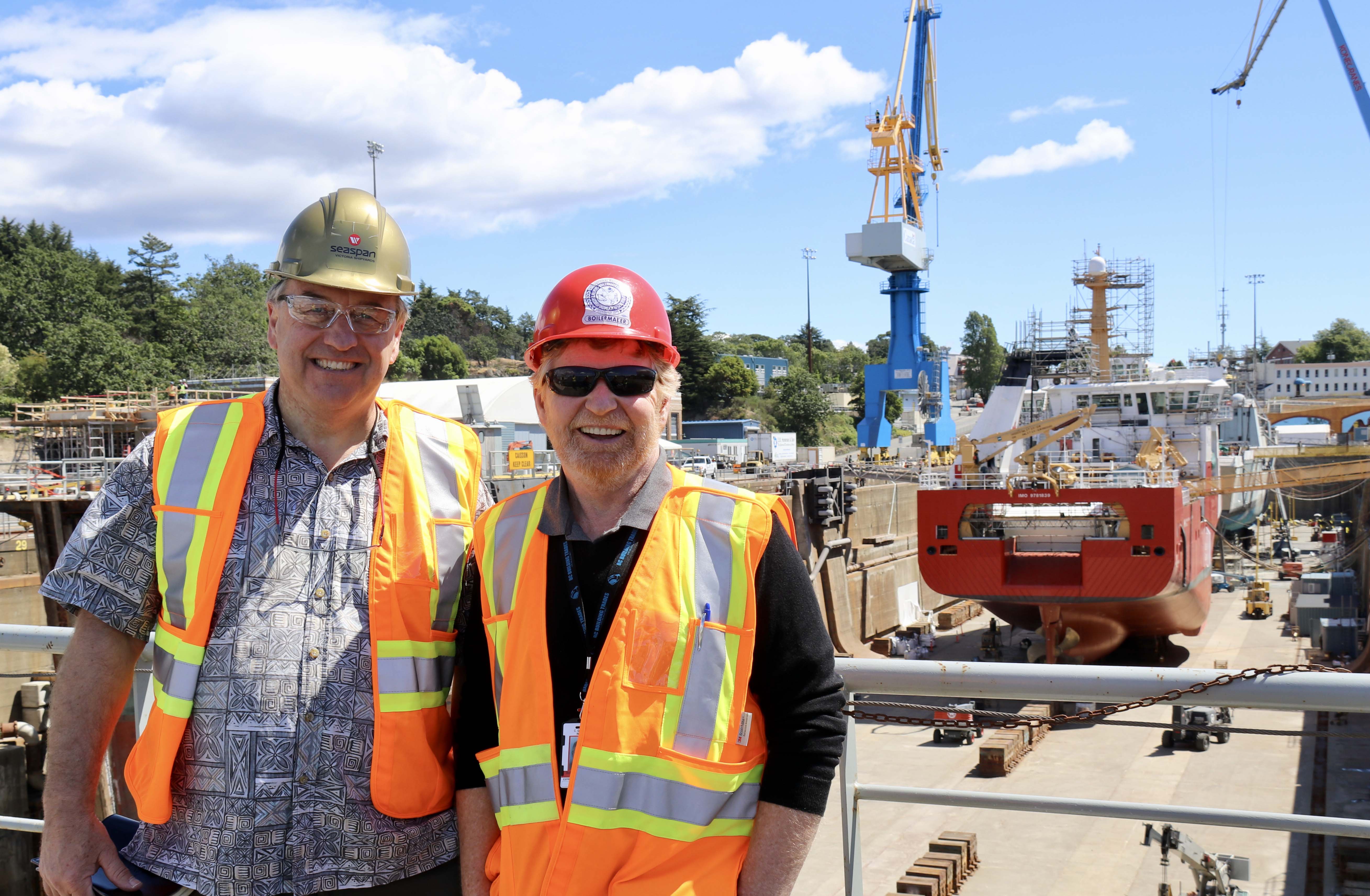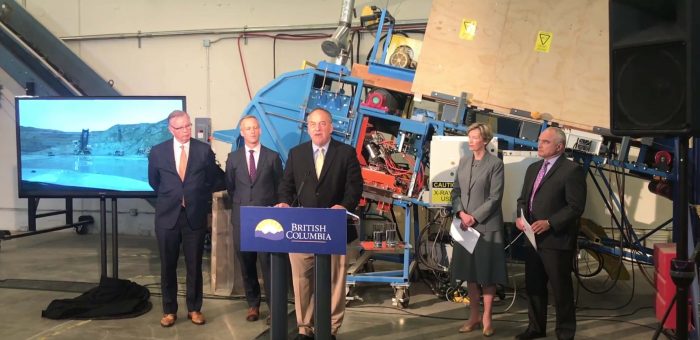Economy
Statement on Labour Day
Monday September 3 is Labour Day, a day where we collectively recognize the achievements of Canadian workers and the right of all British Columbians to safe and equitable employment. Below is the media statement I released in celebration of Labour Day.
Media Statement
Andrew Weaver statement on Labour Day
For immediate release
August 31, 2018
VICTORIA, B.C. – Andrew Weaver, leader of the B.C. Greens, issued the following statement today in recognition of Labour Day:
“On Labour Day we recognize the achievements of Canadian workers and the right of all British Columbians to safe and equitable employment.
“Our job landscape is changing. Amidst trends like the rise of the gig economy, the ever-changing nature of technology and the implications of climate change, it is vital that governments actively modernize our policies in order to support workers.
“We are excited about the successes of the past year. The Emerging Economy Task Force, for example, is analysing changing trends in the economy to propose policy options for government to ensure our continued success. The Basic Income Expert Committee is exploring how to best support low-income British Columbians so that we are all better prepared for the changing horizons of the workforce. Increased investments in advanced education, skills, and training are helping our workforce grow and diversify.
“As we head into the fall we continue to focus on the changing nature of work and strive to bring British Columbians the investments and services they need to succeed.
“On behalf of my colleagues, I’d like to wish all British Columbians a safe and happy Labour Day weekend.”
-30-
Media contact
Jillian Oliver, Press Secretary
+1 778-650-0597 | jillian.oliver@leg.bc.ca
On Ontario’s cancellation of its basic income pilot
Over the last week, I have been following the news that Ontario has decided to cancel its basic income pilot, only one year into what was supposed to be a 3-year project.
I am saddened by the decision made by the government of Ontario, for a number of reasons.
I was, of course, looking forward to learning from Ontario’s pilot project, which would have provided a wealth of evidence about the effects of basic income. Ontario was leading the country in assessing the impacts of this policy, and their project was being watched around the world. They were tracking changes in employment, health, education, food security and housing, as well as community-level effects in Lindsay, with independent assessment by university researchers.
Before Ontario, the last pilot in Canada took place in Dauphin, Manitoba, over 40 years ago. This pilot illustrated some very promising results: in just 3 years, hospital visits were reduced by 8.5%.
Researchers attributed this marked decrease to lower levels of stress in low income families, which resulted in lower rates of alcohol and drug use, lower levels of domestic abuse, fewer car accidents, and lower levels of hospitalization for mental health issues.
In deciding to cancel the pilot, Ontario, and our whole country, has lost a significant opportunity to learn about the effects of basic income and to be on the leading edge of exploring this policy.
But what has struck me the most in the last week since the news of cancellation are the individual stories coming out of Ontario, from those enrolled in the pilot, whose lives are deeply affected by this decision.
So many stories have highlighted how people’s lives changed once they began receiving basic income. These stories have highlighted, too, the substantial human cost to cancelling this pilot part way through, when thousands of people had made plans and decisions on what they thought was stable ground.
Some participants in the pilot decided to attend college for the first time, or returned to school, to pick up the skills needed for meaningful employment or to start a new career. Others began living independently, or found secure accommodation for the first time. For some, it was the newfound ability to afford healthy food and other small things to improve the quality of their lives, and the lives of their children. Others used the income to pay down long-standing debts.
Many spoke about the reduced stress they felt, the ability to plan into the future instead of worrying only about the day-to-day, and a feeling of greater independence and dignity.
Many participants in the program were working, but still couldn’t afford the necessities of life and make ends meet.
One individual who was part of the pilot wrote to me highlighting the impact that basic income had on him and his family. Despite both working, he and his wife had amassed a significant amount of debt, which they struggled to pay off as they tried to provide for their children. The program, he said, was allowing them to pay down their debt and do more with their children. Most importantly, he said, he could finally see the light at the end of the tunnel to better days, for him and his children.
In his words, “this program … gave people that really needed hope a lot of hope for a brighter future.”
These individual stories speak to the promise I believe basic income holds – as a better way to support people as they navigate the economic challenges of the 21st century. Recent years have seen disproportionate increases in part-time and contract work. Wages have stagnated while the cost of living in our cities has spiralled out of control. Meanwhile, studies estimate that half of Canadian jobs could be impacted by automation in the next decade alone. We proposed exploring basic income in B.C. because we believe that government needs to have a plan for the changes on the horizon.
The experiences of people in Ontario has made me see even more strongly the need to do serious work exploring this policy. I have previously written a four part series (Part I, Part II, Part III, and Part IV) outlining why I think basic income is an idea that we need to explore in BC. Establishing a pilot project formed a key aspect of the Income Security component of our BC Green 2017 election platform.
We’re forging ahead in BC with our expert committee, an expert panel comprising three distinguished researcher that launched last month and is studying how basic income could work in BC. This committee is the first step towards fulfilling a government commitment under CASA to pilot basic income in BC. I am hopeful that the committee’s work will provide the evidence that governments need to decide how to proceed – not only here in BC, but across Canada.
In this time of change, as we grapple with the challenges we face today and on the horizon, policymakers have a responsibility to plan for the future, and to make decisions that will give their citizens the best possible chance to pursue their dreams and to achieve success. In a country as wealthy and as compassionate as ours, that’s the goal our leaders should be working towards.
New property transfer data requirements show it’s time to close bare trust loophole
Today the government announced that it was taking steps to collect data to ensure transparency of ownership of properties purchased through a corporation or a trust. As I note in the media release below, improving data collection and transparency is a good first step, but the province should proceed with applying property transfer tax to the transfer of beneficial ownership. Doing so would plug a loophole that lets corporations and wealthy individuals avoid paying BC’s property transfer tax.
It’s been almost five years since I began urging government to close this so-called bare trust loophole as was done in Ontario many years ago. Doing so is one of the most important steps government can take to crack down on speculative activity in the housing market.
Finally, and coincidentally, Great Britain announced similar measures today for offshore buyers. But in the UK case, stiff penalties and even jail sentences are being proposed if people “fail to register or attempt to file false information“.
Media Release
New property transfer data requirements show it’s time to close bare trust loophole: Weaver
For immediate release
July 25, 2018
VICTORIA, B.C. – Andrew Weaver, leader of the B.C. Green Party, says the government’s move to collect information on beneficial ownership of properties underscores the immediate need to close the bare trust loophole. Bare trusts allow for the transfer of beneficial ownership within trusts. Since no title change occurs, no property transfer tax (PTT) is paid.
“This data collection is a good first step, but the province should proceed with applying property transfer tax to the transfer of beneficial ownership,” said Weaver.
“Speculation is a major driver of the housing affordability crisis. The bare trust loophole incentivizes speculation. Preventing individuals and corporations from using it to avoid paying taxes is low-hanging fruit and should be dealt with immediately. Applying the PTT to beneficial ownership has been done in Ontario and is what is needed to close this loophole once and for all.”
Weaver has called for the closure of the bare trust loophole since 2015. The government first announced its intention to collect additional data on beneficial ownership in the February provincial budget. Today, it announced that it will begin the data collection on September 17, 2018.
-30-
Media contact
Jillian Oliver, Press Secretary
+1 778-650-0597 | jillian.oliver@leg.bc.ca
Community benefits agreements & the proposed BC Infrastructure Benefits Inc.
Earlier this week the BC government announced 2 public infrastructure projects that will be delivered under “Community Benefit Agreements” (CBAs), and the creation of a new Crown corporation, BC Infrastructure Benefits Inc., (BCIB) that will oversee the implementation of these agreements.
In response to media requests on this announcement we issued the following statement :
“Community benefit agreements are a great way to invest in our province’s future and a key tool that government can use to advance social and environmental goals. In particular, investing in training and apprenticeships for young people, First Nations and women will help set those British Columbians up for long-term success, which will have significant knock-on benefits for our province and its communities.
I look forward to seeing the details of the government’s overall framework. I will be looking to ensure that it is fair and effective from a policy perspective, rather than a political or ideological one. While our caucus’ approach to labour policy differs in some respects from the BC NDP’s, I believe there are significant opportunities for us to collaborate to modernize BC’s laws so that we can best set British Columbians up for success amidst major global economic shifts.
I look forward to seeing the details of this agreement and working with Minister Bains to meet our CASA commitment to find innovative ways to improve fairness for workers.“
In response to a number of questions, I wanted to expand on this statement.
Without a doubt, CBAs can be a good policy tool to accomplish important objectives for public construction projects, such as increased apprenticeships, increased participation for indigenous trades workers, women and other underrepresented groups, commitment to local hiring, and more certainty on wages on project timelines.
A strong building trades labour force is critical for our province’s future. To meet our climate targets and build a stronger, sustainable economy, we are going to need to make significant investments into our existing building stock, as well as building new infrastructure including public transportation. We also need to ensure our workforce develops, in particular by ensuring that there are enough apprenticeship opportunities to train new workers.
However, CBAs must be advanced as a policy tool to address the values I outlined above – not as a tool to pay back political favours or to advance ideology at the expense of good policy. We have made this perspective clear to the government, and will be applying this approach to reviewing how the government awards Community Benefit Agreements in the future.
We have also asked government to provide reasoning for why the two projects announced earlier this week had a unionization requirement for workers on these two sites.
It is our view that CBA should be applicable for both union and non-union trade shops and that we are focused on ensuring that whoever is competing for a contract is meeting the requirements laid out in the CBA. To be clear – CBAs can be good policy, providing a good tool for government to help drive the development of a strong building trades labour force, as long as we use them for policy not partisan reasons.
Announcing BC’s Emerging Economy Task Force
This past Tuesday, the BC Government officially launched the Emerging Economy Task Force. The BC Greens proposed the establishment of the Emerging Economy Task Force as a means of addressing how technology, innovation and global trends are changing business and society. This task force brings together key people who can identify the challenges we will face in the years ahead, and help us capitalize on the opportunities that arise.
The launch occurred at the offices of Minesense, a BC-based company that exemplifies innovation in the resource sector.
Below I provide the video and text of my remarks at the launch. I also attach the accompanying BC Green Caucus press release.
Video of Speech
Text of Speech
I’m delighted to join Minister Ralston and BCIT President Kathy Kinloch in announcing the launch of the Emerging Economy Task Force.
I can think of no better location that the offices of Minesense Technologies here in Vancouver for such an announcement.
Minesense’s real-time, sensor-based ore sorting technologies embody BC innovation at its finest and provide a perfect example of what’s needed for BC to emerge as a global leader in the 21st century economy.
The future of economic prosperity in BC lies in harnessing our innate potential for innovation and bringing new, more efficient technologies to bear in the resource sector.
BC will never compete in digging dirt out of the ground with jurisdictions that don’t internalize the same social and environmental externalities that we value.
We will excel through being smarter, more efficient, & cleaner.
This means that we not only export the dirt, but we also export the knowledge, technology and value-added products associated with resource extraction.
And that’s where companies like Minesense come in.
The BC Green Party originally proposed the establishment of an Emerging Economy Task Force as a key aspect of our 2017 election platform. It subsequently became an integral component of our confidence and supply agreement with the BC NDP.
We know that technology, innovation, and global trends are set to have significant impacts on our economy. While they present profound challenges they also provide incredible opportunities.
Take, for example, the increasing worldwide use of automated technology.
Automation could transform our workplaces and change the very nature of employment.
Studies estimate that half of Canadian jobs could be impacted by automation in the next decade alone.
In response to such changes, government needs to have a plan.
Many of the jobs that the next generation will be preparing for don’t even exist today.
And we are still on the cusp of witnessing the impacts that breakthrough technologies like 3d printing will have on our supply chains.
As the global economy changes, new opportunities are also created. But the advantages of these opportunities will flow to those who lead – not to those who follow.
The task force announced today will strategically help British Columbia as we embrace the new and emerging economy.
I’m delighted that the BC NDP Government recognized the importance of this initiative.
And I’m grateful to the remarkably talented individuals who’ve agreed to serve on the Emerging Economy Task Force. They bring a range of expertise and experience, from industry, business, and academia to the team.
They’ll play a critical role in helping us identify the challenges ahead, and advise on how to respond, and on how to capitalize on the opportunities that arise.
It’s truly an exciting time for innovation in British Columbia.
Thank you.
Media Release
Weaver welcomes launch of emerging economy task force
For immediate release
July 10, 2018
VICTORIA, B.C. – Today Andrew Weaver welcomed the launch of the Emerging Economy Task Force (EETF). The EETF was a key B.C. Green platform commitment and part of the confidence and supply agreement between the B.C. Green caucus and government.
“I am thrilled to join Minister Ralston to launch the Emerging Economy Task Force today,” said Andrew Weaver, Leader of the B.C. Green Party.
“We know that technology, innovation and global trends are having significant impacts on our economy. These changes present both huge challenges and enormous opportunities for B.C.”
The EETF will analyse trends occurring in the economy, including technological change and global trends, and propose policy options for government to ensure B.C.’s continued economic success amidst these changes.
“The members of the EETF bring a range of expertise and experience, from industry, business and academia. Their analysis and advice will help us build a competitive advantage as we navigate this new type of economy.
“This task force is an opportunity to challenge how government typically thinks. Too often, governments don’t plan much into the future beyond the next election cycle. The Emerging Economy Task Force well help ensure government has the information they need to make informed decisions so that B.C. can succeed in the years ahead.”
-30-
Media contact
Jillian Oliver, Press Secretary
+1 778-650-0597 | jillian.oliver@leg.bc.ca







